Susan Goethel Campbell’s “Garden Repairs” traverses the intersection of natural and man-made worlds

Not long before visiting Ferndale-based artist Susan Goethel Campbell’s Garden Repairs installation at the U-M’s Institute of the Humanities, I’d shared a photograph on social media of a cluster of snow-dusted daffodils in my backyard, shriveled and hunched over. I’d been struck by how often nature mirrors human gesture; how these flowers visibly conveyed what many of us were feeling that morning, as we pulled winter coats and gloves back out of our closets, just days after walking around in shorts. I’d wondered if the natural world shaped the way our physical bodies communicate emotion, or if this is all, in fact, subtle, visible evidence of our inter-relationship with each other.
As it happens, this train of thought was a perfect foundation for experiencing Campbell’s work, which marries the natural and man-made worlds in surprising ways.
Things to See: Pulp Art Exhibit Roundup for Winter
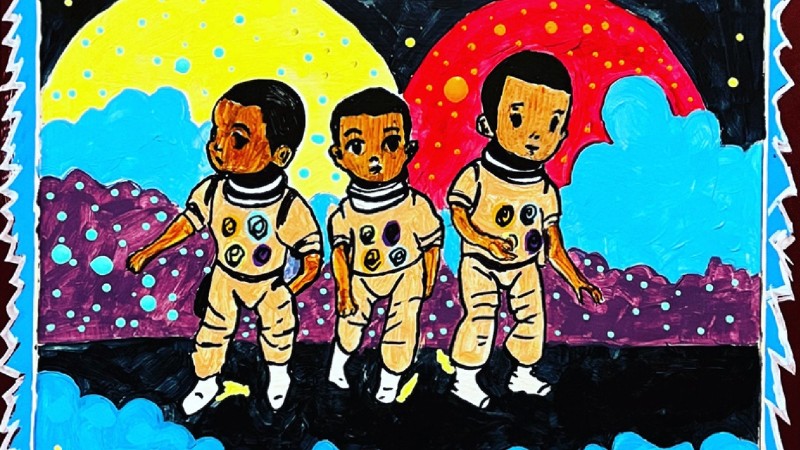
While it’s too cold to spend time outside this winter, there are plenty of places to stay warm indoors and peruse artwork from local creatives. We’ve compiled a comprehensive list of visual art exhibits and events around Washtenaw County to visit and enjoy this season.
720’ 10”
January 25 to April 12
North Campus Research Complex Galleries, Ann Arbor
Designer and sculptor Peter Dunn’s body of work is rooted in the shutdown of shops and studios during the pandemic and the inability to receive materials for large sculpture and furniture fabrication. At its core, much of his work studies the manipulation of simple geometry. Dunn looks at the form from different forced perspectives—exploding, augmenting, slicing, repeating, and lighting. An opening reception will take place January 25 from 4 pm-7 pm.
Stamps School of Art & Design Staff Exhibition
January 25 to April 12
North Campus Research Complex Galleries, Ann Arbor
This exhibit features artwork from U-M’s Penny Stamps School of Art & Design staffers Catherine Coveyou, Elizabeth Dizik, Veronica Falandino, Rita K. Lee, Matthew Pritchard, Joel Rakowski, Joe Rohrer, and Veronica Tabor. An opening reception will take place January 25 from 4 pm-7 pm.
Anything Goes: All Media Exhibition
January 26 to March 2
Gutman Gallery, Ann Arbor
The fourth annual all-media exhibition will highlight artists, styles, and techniques of all kinds and be juried by Ingrid Ankerson, an Ypsilanti printmaker, quilter, graphic designer, and instructor.
AADL 2023 STAFF PICKS: HOMEPAGE
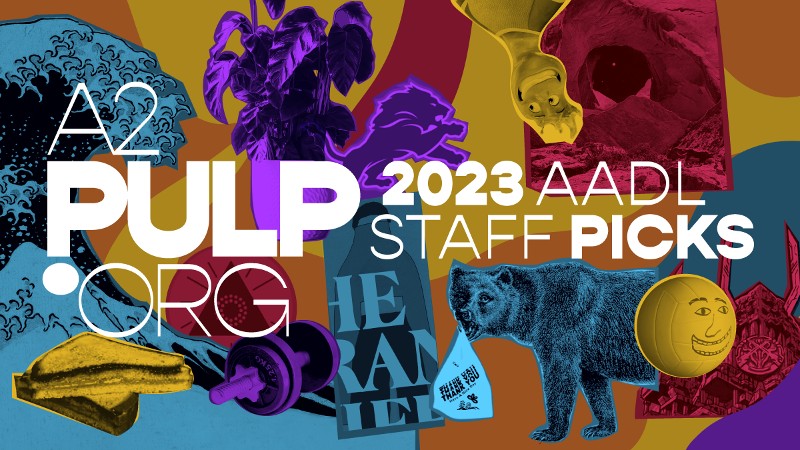
People who work at the Ann Arbor District Library love to give recommendations.
Whether in person at one of the five branches, in the News and Reviews section of AADL's website, or right here at Pulp, highlighting our favorite books, films, TV shows, video games, websites, adventures, and more is just part of the gig.
Like you, we are passionate enjoyers of media and experiences.
This is our seventh year compiling Ann Arbor District Library staff picks—and with more than 40,000 words spread out over four posts, it is the longest edition yet.
To reiterate: We. Love. To. Give. Recommendations.
Here are the creative works and experiences we discovered in 2023 that moved us enough to share them with you. (Not that you needed to twist our arms.)
➥ AADL 2023 Staff Picks: Words
➥ AADL 2023 Staff Picks: Screens
➥ AADL 2023 Staff Picks: Audio
➥ AADL 2023 Staff Picks: Pulp Life
Nawal Motawi's strong will and fierce individuality fire her acclaimed art-tiles studio in Ann Arbor
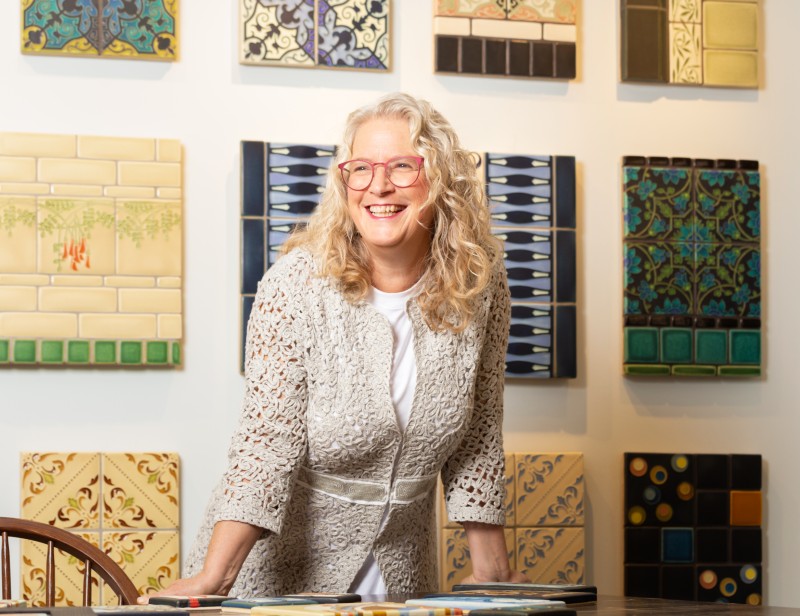
It took about a year and a half before Nawal Motawi dropped out of art school.
“I was really disgusted with what it looked like,” she says.
Motawi, who founded the renowned Motawi Tileworks in 1992, was enrolled at the Penny Stamps School of Art and Design at the University of Michigan. Abstract expressionism was in vogue and the emphasis in classes was less on how well each piece of art was made, Motawi says, than on how intricately they could be interpreted.
“What I felt like I learned in art school was that, basically, if you could tell a good story, then [your work] was [considered] good,” she says.
The Ann Arbor-based Motawi Tileworks, where Nawal Motawi continues to serve as owner and artistic director, recently celebrated its 30th anniversary. To honor the occasion, the retrospective exhibit Motawi Tileworks: A Celebration of 30 Years is on display at the Rogel Cancer Center at the University of Michigan Hospital until December 23.
Motawi’s impatience with some of its more voluble aspects of art school came to a head after a particular sculpture class.
Things to See: Pulp Art Exhibit Roundup for Fall
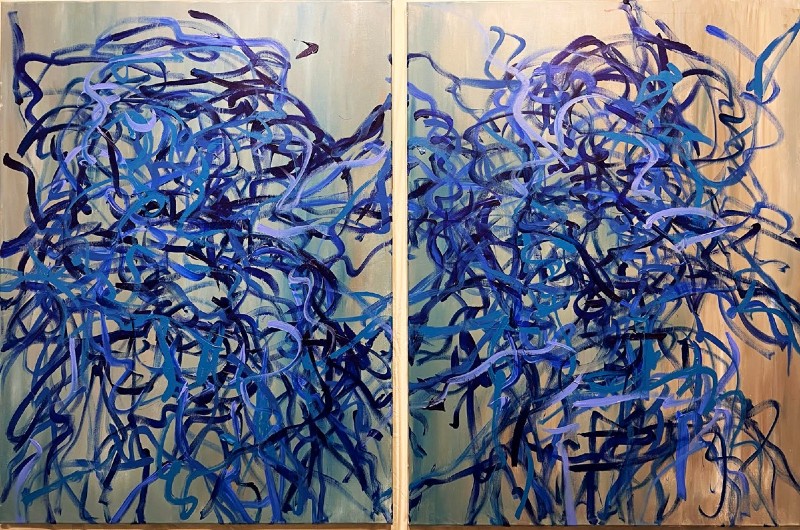
There’s plenty of color, creativity, and innovation to absorb visually at several local art exhibits and events this fall. Peruse our comprehensive list for something that catches your eye and expands your mind.
Penny Stamps Speaker Series: Refik Anadol
October 19, 5:30 pm-7 pm
Michigan Theater, Ann Arbor
This University of Michigan Penny Stamps Speaker Series event raises the following question: If machines can “learn” or “process” individual and collective memories, can they also dream or hallucinate about them? Since 2016, world-renowned new media artist Refik Anadol has been exploring the relationship between the human mind, aesthetics, machine-learning technologies, and architecture to speculate responses.
Coining the terms “AI Data Painting,” “AI Data Sculpture,” and “latent cinema,” Anadol has been reflecting on new multisensory forms of narrating collective memory in physical and virtual spaces and inviting his audience to imagine alternative and dynamic realities.
Bellwether
Through October 19
Eastern Michigan University School of Art & Design, Ypsilanti
Bellwether is a two-person exhibition combining the photo collage work of Shanna Merola with Clara DeGalan’s landscape paintings. While DeGalan focuses on the spiritual and phenomenological aspects of humanity’s relationship to land, Merola’s work examines its socioeconomic impacts and ramifications.
Diasporic Distillations: "We are here because you were there" at A2AC explores works by Asian American / Asian artists
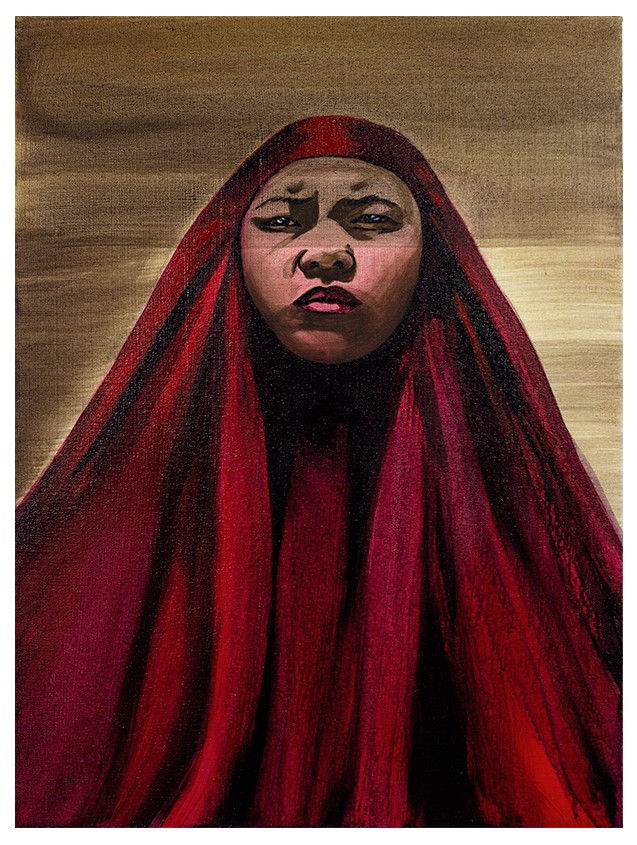
The new exhibit at Ann Arbor Art Center (A2AC), We are here because you were there, highlights issues facing the Asian American and Pacific Islander (AAPI) diaspora living in a post-colonial world.
Curated by Chien-An Yuan, a multi-disciplinary artist in his own right, the exhibit features the work of Asian American / Asian artists Kim Jackson DeBord, Laura Kina, Larry Lee, Cori Nakamura Lin, Okyoung Noh, and Sherina Rodriguez Sharpe. It is formally presented by the Michigan Asian Pacific American Affairs Commission.
“I reached out to Chien about co-curating a show revolving around the concept of displacement/DREAMERS/living between various cultures,” said A2AC gallery director Thea Eck about the exhibit, which runs through October 22. “As a gallery director, I saw a chance for myself to lean out and for him to lean in. It felt more natural for me to support his ideas as they became more focused and honed in. This is part of allyship and part of the A2AC Exhibition program's vision: To recognize when it's best to play support to someone who is in a specific community. We can be the loudspeaker to amplify and give space, time, and a budget to.”
UMMA's "Arts & Resistance" exhibits look at the role of creative works in fighting for cultural change
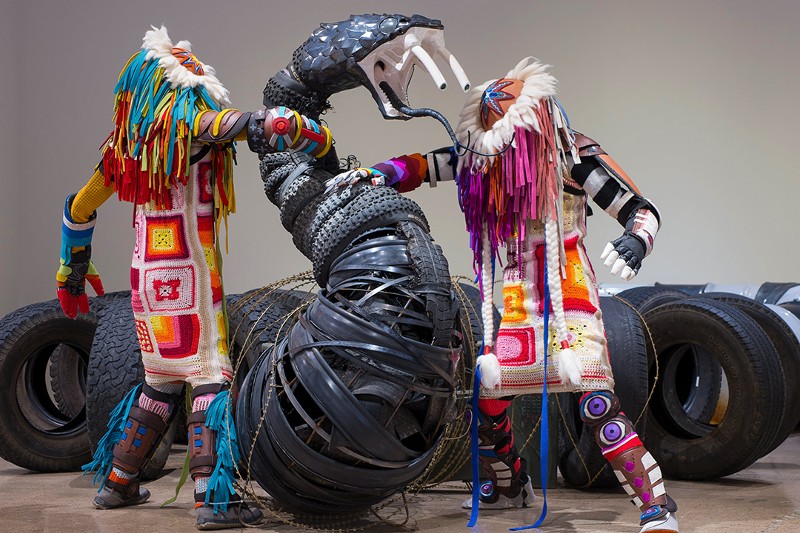
Artists resist.
They share unique visions, even those that run counter to cultural norms. And they resist attempts to shut down museums, to cancel productions of plays, to ban books.
Artists also resist death by creating work they hope will outlive them. Shakespeare knew: “Not marble, nor the gilded monuments of princes shall outlive this powerful rhyme."
For the fall semester, the University of Michigan is exploring ways artists resist social ills and injustices with Arts & Resistance, a campus-wide partnership between departments and galleries organized by the University of Michigan Museum of Art (UMMA) and the U-M Arts Initiative.
UMMA's three exhibits for Arts & Resistance document a history of wrongs that include slavery, appropriation of Native American land, and systemic racism.
Everyday Talismans: Amy Sacksteder's new Ann Arbor Art Center Exhibit is a collage of colors
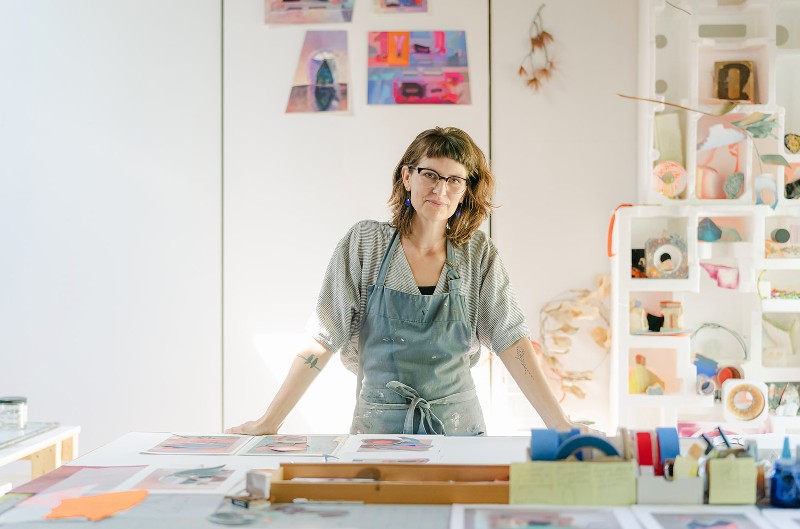
Amy Sacksteder explores life through collage art in a new exhibit at the Ann Arbor Art Center.
Talismanic: The Collected Collages of Amy Sacksteder, on display through October 7, features four different series that she completed over eight years: Generations (2015), Grounded/Ungrounded (2019), Time Ghosts (2019-2020), and Echo Keepers (2021).
While the collages tend toward abstraction, the images are inspired by scenes and items in Sacksteder’s life, whether it's the natural beauty surrounding her house or the various common objects that reside within it. The cumulative effect of the Talismanic collection gives viewers the impression they are seeing snapshots from a personal photo album.
Things to See: Pulp Art Exhibit Roundup for September
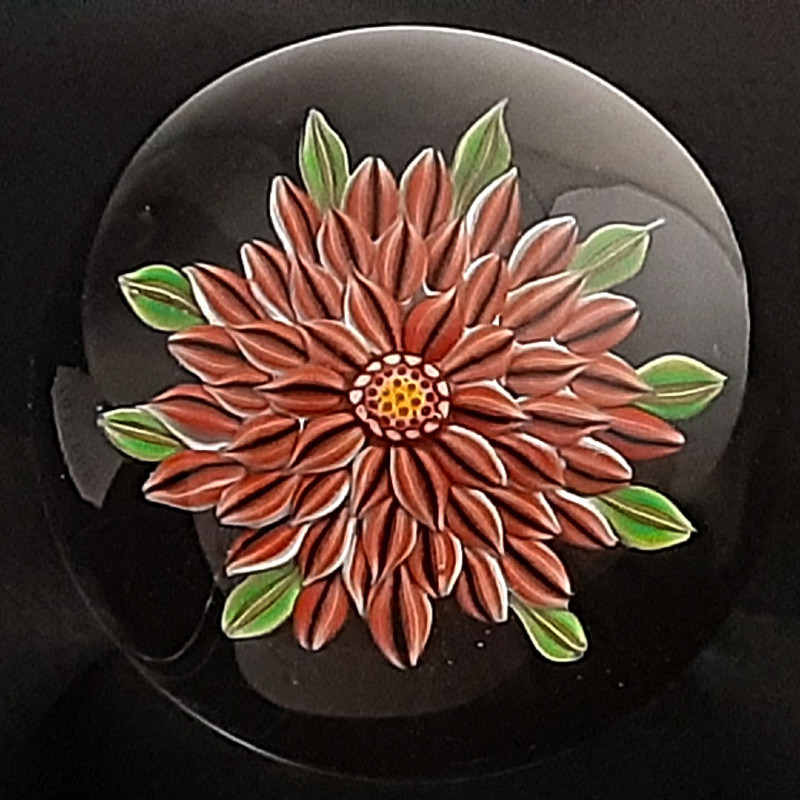
With fall not too far away, we’re anticipating another season full of vibrant colors and landscapes. However, a lot of that color vibrancy can also be found indoors at several art exhibits this month in Washtenaw County. Check out this list of exhibits featured at local galleries in September.
1968: A Folsom Redemption
September 1-October 20
Chelsea District Library, Chelsea
1968: A Folsom Redemption is a collection of photographs and memories of two journalists—photographer Dan Pousch and writer Gene Beley—lucky enough to be among a handful of eyewitnesses to the historic Johnny Cash concerts at Folsom Prison. The exhibit is available to view in the library's McKune Room.
A Colorful Dream
September 1-October 20
Ypsilanti District Library, Ypsilanti
A Colorful Dream is a family-friendly exhibition by fine art photographer Adrien Broom. Designed to evoke and capture a sense of childhood fantasy, Broom’s work is deeply rooted in fairy tales and mythology, taking the viewer on a journey through the entire spectrum of the rainbow. The exhibit is available to view at the Whittaker branch during library hours.
Retired Eastern Michigan University Professor and Ypsilanti Sculptor John Nick Pappas Dies at 88

John Nick Pappas, a retired professor of sculpture and drawing at Eastern Michigan University, died on July 6. He was 88.
Throughout his career, Pappas created sculptures in his Ypsilanti studio for Ann Arbor’s Saint Joseph Mercy Hospital (now Trinity Health Michigan), the University of Michigan’s Medical School campus, Detroit’s Blue Cross Blue Shield of Michigan headquarters, and other hospitals and public places. He also created a program at EMU to have student art installed on campus.
Pappas’ daughter Catherine Pappas revisited her father’s career in the winter of 2015 for Ypsilanti Gleanings:
“He still runs into former students, even though he’s been retired for many years now. I’ve been with him on more than one occasion when this has happened and I can tell you, it is pretty special. It makes me beam with pride when I see and hear about the incredible role he has played in the lives of many of his students. Back in the late 70’s, three of his graduate students; Ed Olson, Paul Mauren, Jeanne Flanagan and my oldest brother Nick worked with him in his studio to help create the Blue Cross piece, which took four years to complete.”
The rest of Catherine’s story, “My Dad, John Nick Pappas, Sculptor” can be read here.
Pappas also did an interview on September 27, 2022 with Creative Washentaw's Deb Polich for "creative:impact" on WEMU-FM 89.1.


































